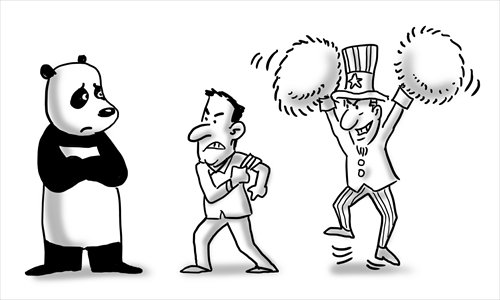US advances rebalance strategy by provoking Hanoi over Xisha

Illustration: Shen Lan/GT
After sending a warship to China's Xisha Islands, the US has been hyping up China's deployment of missile defense systems on Yongxing Island recently. Washington is not only pressuring Beijing over the South China Sea issues, but also instigating conflicts between Beijing and Hanoi.
Directly challenging China's sovereignty and security in the South China Sea is not an ideal choice for the White House. Stirring up tensions between China and ASEAN countries, especially the South China Sea claimants, seems to be the best approach for the US. In this way, Washington can take advantage of regional tensions to promote its Asia-Pacific rebalance policy.
However, despite a few achievements, the overall effects of the US strategy are not satisfying. ASEAN hopes to maintain constructive relations with both the US and China. The ASEAN members have different attitudes towards the South China Sea disputes, and thus it is hard for them to reach a consensus to counter China.
The outcomes of the just concluded US-ASEAN Summit serve as an implication for the White House.
Among the South China Sea claimants, only the Philippines and Vietnam actively run against China. Nonetheless, given its relatively weak strength, Manila is unlikely to make waves. This has led the US to turn more attention to Vietnam.
Yet Hanoi's performance has disappointed Washington. The China-Vietnam relationship is easing after experiencing tensions for some time. The 12th National Congress of the Communist Party of Vietnam which concluded last month has clarified the nation's diplomatic goals as safeguarding a peaceful and stable environment and stabilizing Hanoi's relations with major powers.
This means focusing on domestic development is still a core task for Vietnam. Hanoi does not want the South China Sea issues to impede its domestic efforts to develop economy, enhance national strength and improve people's livelihood.
Vietnam still hopes to maintain a stable and cooperative relationship with China, a neighboring socialist power. Hanoi lacks reason and will to be a pioneer in clashing with Beijing over the South China Sea disputes.
Under this situation, how to incite Vietnam against China has become a task for the US. The recent two provocations in the Xisha Islands is an attempt by the White House to instigate Beijing-Hanoi tensions.
To begin with, the Xisha Islands stay at the core of Vietnam's sovereignty claims over the South China Sea. According to Vietnam, a lot of evidences backing up its South China Sea sovereignty claims point to the Xisha Islands. Following decades of propaganda and education, Vietnam's citizens pay particular attention to the Xisha Islands.
In addition, Vietnam always hopes it can make some breakthroughs over the Xisha Islands.
The islands have remained firmly under China's control for a long time. Beijing does not acknowledge territorial disputes over the islands.
Thus, forcing China to acknowledge sovereignty disputes over the Xisha Islands or leaving the impression to the international community that the islands are disputed has become a significant goal of Vietnam in recent years.
Furthermore, stirring up troubles over the Xisha Islands helps to push Vietnam to the frontline to counter China. In the Nansha disputes, Hanoi can choose not to deeply involve, but beat the drums for ASEAN to forge a consensus against China instead of directly confronting Beijing.
The situation over the Xisha Islands is different. As other ASEAN nations have no claims over Xisha, Vietnam has to face up to China alone. It would be hard for Hanoi to adopt flanking tactics. The likelihood of direct China-Vietnam confrontation remains high.
Therefore, this is a highly strategic attempt for the US to stir up trouble over the Xisha Islands. Spotting Vietnam's attempt towards Xisha, the White House expects to arouse Hanoi's fighting will against Beijing.
By taking advantage of Vietnam's will to make breakthroughs over its Xisha claims, the US attempts to direct tensions from Nansha to Xisha, tricking Vietnam into taking actions.
By arousing Vietnam's domestic nationalist sentiments, the White House expects to see Hanoi-Beijing collisions, which may force Hanoi's government to directly confront Beijing. The US attempts to push Vietnam to the frontline to counter China, paving the way for its rebalance policy in the Asia-Pacific region.
The Vietnamese government has the wisdom to see through the US tricks. Yet, it requires careful considerations for Vietnam to respond rationally.
The author is a research fellow with Guangxi Southeast Asian Studies Center. opinion@globaltimes.com.cn